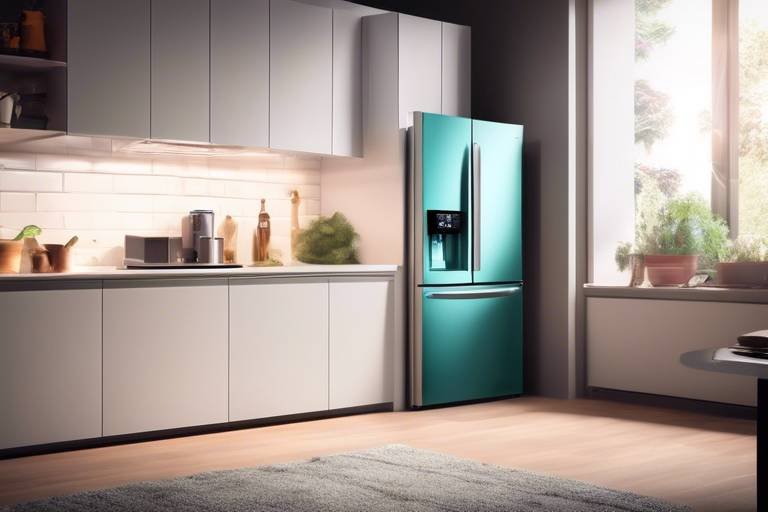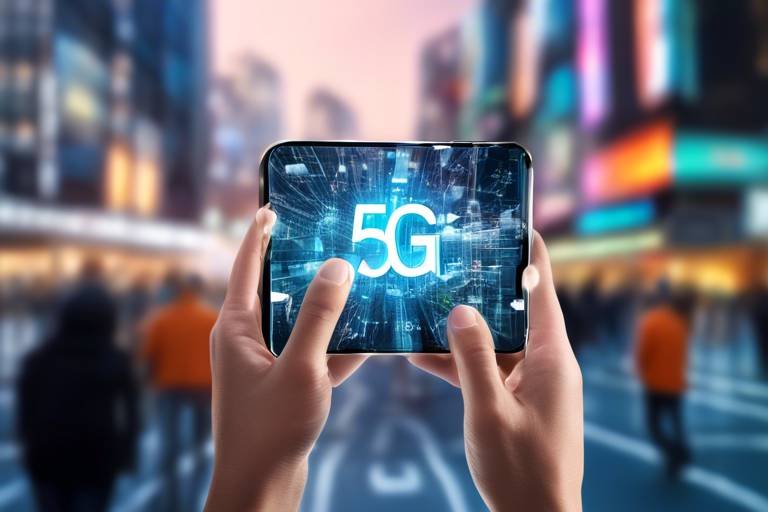How Smart Appliances are Reshaping Home Living
In today's fast-paced world, the way we live and interact with our homes is undergoing a remarkable transformation, thanks to the advent of smart appliances. These innovative devices are not just a trend; they represent a significant shift in how we manage our daily lives, making them more efficient, convenient, and secure. Imagine waking up in the morning to the aroma of freshly brewed coffee, all thanks to a coffee maker that you programmed the night before. Or picture leaving your home and being able to check if you locked the door with just a tap on your smartphone. This is the reality that smart appliances bring to the table, enhancing our living experiences in ways we never thought possible.
The rise of smart appliances is largely due to the rapid advancements in technology, which have made these devices more accessible and affordable for the average consumer. From refrigerators that can monitor your grocery inventory to washing machines that can be controlled remotely, smart appliances have become integral to modern households. They’re not just about luxury; they’re about functionality and efficiency. As we delve deeper into the ways these devices are reshaping our home environments, it’s essential to understand their evolution and the myriad benefits they offer.
Smart appliances have come a long way since their inception. Initially, they were seen as futuristic gadgets that only tech enthusiasts could afford. However, with the proliferation of the Internet of Things (IoT), these devices have become mainstream. Today, you can find smart appliances in various categories, including kitchen gadgets, cleaning devices, and even security systems. The integration of artificial intelligence and machine learning has further propelled their capabilities, allowing them to learn from user behavior and adapt accordingly. This evolution has not only changed how we interact with our homes but has also set the stage for a more connected lifestyle.
So, what makes smart appliances so appealing? The benefits are numerous, and they significantly enhance our everyday lives. Here are some of the main advantages:
- Energy Efficiency: Smart appliances are designed to use energy more efficiently, leading to lower utility bills and a reduced carbon footprint.
- Convenience: With automation and remote control features, these devices save time and effort, allowing us to focus on what truly matters.
- Enhanced Security: Many smart appliances come equipped with advanced security features, providing peace of mind for homeowners.
These advantages not only improve our quality of life but also contribute to a more sustainable future. As we explore specific functionalities, it becomes clear that smart appliances are not just tools; they are essential components of a modern lifestyle.
One of the standout features of smart appliances is their ability to save energy. This is particularly important as we all strive to be more environmentally conscious. For instance, smart thermostats can learn your heating and cooling preferences over time, automatically adjusting settings to optimize energy use. This means you can enjoy a comfortable home while keeping your energy bills in check. Imagine slashing your monthly utility costs while also contributing to a greener planet!
Smart thermostats are a game changer in home energy management. They allow you to control your home's temperature remotely through a smartphone app. You can set schedules, adjust the temperature while you're away, or even let the device learn your habits for automatic adjustments. This not only ensures comfort but also significantly reduces energy consumption. According to research, households that use smart thermostats can save up to 10-15% on heating and cooling costs.
Similarly, smart lighting systems empower users to control their lighting remotely, enhancing both convenience and energy savings. You can set timers, adjust brightness, or even change colors based on your mood, all from your smartphone. These systems promote sustainability by allowing you to turn off lights when not in use, ensuring that energy is not wasted unnecessarily. It’s like having a personal lighting designer at your fingertips!
Beyond energy efficiency, smart appliances excel in providing convenience through automation. Imagine a world where your washing machine starts a cycle while you're still at work, or your oven preheats itself before you even step into the kitchen. These devices streamline household chores, allowing you to spend more time on what you love. With the integration of voice assistants like Alexa or Google Assistant, you can control your appliances with simple voice commands, making your daily routines smoother and more enjoyable.
Security is another critical area where smart appliances shine. Many of these devices come equipped with advanced security features that protect your home and loved ones. For instance, smart locks offer keyless entry and can be controlled remotely, ensuring you never have to worry about lost keys again. You can grant access to guests or service providers even when you're not home, enhancing convenience without compromising security.
Smart locks are revolutionizing home security. They provide various features such as remote locking and unlocking, activity logs, and even temporary access codes for guests. This means you can monitor who enters and exits your home, providing an added layer of safety. Imagine being able to check the status of your front door from anywhere in the world—it's peace of mind at your fingertips!
Smart cameras take home security a step further by offering real-time monitoring and alerts. These devices can send notifications to your phone if they detect motion, allowing you to keep an eye on your home from anywhere. Whether you're at work or on vacation, you can rest easy knowing that you have a virtual watchdog keeping watch over your property. It’s like having a security guard available 24/7!
As technology continues to evolve, the future of smart appliances looks incredibly promising. We can expect to see even more advanced features, greater integration with AI, and improved interoperability between devices. Imagine a home where all your appliances communicate seamlessly, anticipating your needs and preferences. This level of automation will not only enhance our living experiences but also redefine what it means to have a smart home.
Q: What are smart appliances?
A: Smart appliances are devices that connect to the internet and can be controlled remotely, offering features like automation, energy efficiency, and enhanced security.
Q: How do smart appliances save energy?
A: Smart appliances can optimize energy use by adjusting settings based on user behavior, schedules, and real-time data, leading to significant savings on utility bills.
Q: Are smart appliances secure?
A: While smart appliances can enhance home security, it's essential to follow best practices, such as using strong passwords and keeping software updated, to protect against potential vulnerabilities.

The Rise of Smart Appliances
This article explores the transformative impact of smart appliances on daily living, highlighting their benefits, functionalities, and the future of home automation.
The journey of smart appliances is nothing short of fascinating. It all began with the simple idea of making life easier through technology. Picture this: a world where your refrigerator can tell you when you're out of milk, or your washing machine can be controlled from your smartphone. This isn't science fiction; it's the reality we've stepped into! Over the past decade, advancements in technology have paved the way for these innovative devices, making them not just a luxury but a necessity in modern households.
As we dive deeper into the evolution of smart appliances, we see how they have transitioned from basic automated functions to highly sophisticated systems equipped with artificial intelligence. Initially, these devices were limited to simple tasks, but now they can learn from our habits, adapt to our preferences, and even communicate with each other. Imagine your oven preheating itself based on a recipe you selected on your tablet! This interconnectedness is what makes smart appliances a game-changer.
But what exactly sparked this rise? The answer lies in several key factors:
- Technological Advancements: Innovations in IoT (Internet of Things) have allowed appliances to connect to the internet, enabling remote control and monitoring.
- Consumer Demand: As people seek convenience and efficiency, the market has responded with a plethora of smart options.
- Environmental Concerns: With a growing focus on sustainability, energy-efficient smart appliances have become appealing to eco-conscious consumers.
Moreover, the integration of voice-activated assistants like Amazon Alexa and Google Assistant has further fueled the adoption of smart appliances. Now, you can simply say, "Turn on the lights," or "Start the coffee maker," and voilà! Your wish is their command. This level of convenience has made smart appliances not just useful, but essential for many households.
As we look to the future, it's clear that the rise of smart appliances is just the beginning. With ongoing research and development, we can expect even more innovative features that will continue to enhance our living environments. From smart refrigerators that can create grocery lists to washing machines that can detect fabric types and adjust cycles accordingly, the possibilities are endless. The question is, are you ready to embrace this smart revolution?
Smart appliances offer numerous advantages, including energy efficiency, convenience, and enhanced security. Here, we explore how these benefits improve everyday life for users.
One of the key features of smart appliances is their ability to save energy. This subsection examines how they contribute to lower utility bills and a greener environment.
Smart thermostats optimize heating and cooling systems, significantly reducing energy consumption. This part delves into their functionalities and impact on home energy efficiency.
Smart lighting systems allow users to control light settings remotely, enhancing energy savings. This section discusses their features and how they promote sustainability.
Smart appliances simplify daily tasks through automation. This part highlights how these devices streamline household chores and improve overall living experiences.
Many smart appliances come equipped with security features that protect homes. This section discusses how these innovations contribute to safer living environments.
Smart locks provide keyless entry and remote access capabilities. This subsection explores their benefits and how they enhance home security.
Smart cameras offer real-time monitoring and alerts. This part examines their role in increasing safety and peace of mind for homeowners.
As technology continues to evolve, the future of smart appliances looks promising. This section speculates on upcoming trends and innovations in home automation.
Q1: What are smart appliances?
A1: Smart appliances are devices that connect to the internet, allowing for remote control and monitoring, often featuring automation and energy-saving capabilities.
Q2: How do smart appliances save energy?
A2: Many smart appliances are designed to optimize energy use, such as adjusting power consumption based on usage patterns, which can lead to lower utility bills.
Q3: Are smart appliances secure?
A3: While smart appliances can enhance home security, it's essential to implement strong passwords and keep software updated to protect against potential vulnerabilities.
Q4: Can smart appliances work together?
A4: Yes! Many smart appliances are designed to communicate with each other, creating a cohesive smart home ecosystem.

Benefits of Smart Appliances
Smart appliances are not just a trend; they are a revolution in how we manage our homes. One of the most striking benefits is their energy efficiency. Imagine being able to cut down on your utility bills while also doing your part for the environment. Smart appliances use advanced technology to optimize their energy consumption, which means they only use power when necessary. For example, a smart washing machine can adjust its water usage based on the load size, ensuring that you’re not wasting resources. This kind of efficiency not only saves money but also contributes to a greener planet.
Another significant advantage is the convenience they offer. Picture this: you’re out grocery shopping and suddenly remember that you forgot to set the coffee maker for the morning. With smart appliances, you can simply pull out your smartphone, tap a few buttons, and voilà! Your coffee is brewing, ready for you the moment you wake up. This level of control and automation transforms mundane tasks into effortless experiences. Whether it’s adjusting your thermostat from the comfort of your bed or scheduling your dishwasher to run during off-peak hours, smart appliances make life easier.
Furthermore, smart appliances enhance security in your home. Many of them come equipped with features that allow you to monitor your home remotely. For instance, if you have a smart oven, you can check if you left it on while you’re at work. This not only provides peace of mind but also allows you to take immediate action if something isn’t right. Additionally, many smart appliances integrate with home security systems, providing an extra layer of protection. Imagine receiving an alert on your phone if a door is left ajar or if someone approaches your home—this is the kind of safety that smart technology offers.
Moreover, the integration of smart appliances with other devices in your home creates a seamless living experience. For example, your smart refrigerator can track your groceries and suggest recipes based on what you have at home. This interconnectedness enhances your lifestyle by making meal planning and preparation easier than ever. You can even receive notifications when you’re running low on essentials, ensuring that you never run out of your favorite snacks or ingredients.
In conclusion, the benefits of smart appliances are vast and varied. They not only improve energy efficiency and convenience but also enhance security and integration within your home. As we continue to embrace technology, it’s clear that smart appliances are not just a luxury but a necessity for modern living. With their ability to simplify our lives and make our homes safer, they are truly reshaping the way we experience daily living.
- What are smart appliances? Smart appliances are devices that connect to the internet and can be controlled remotely, often through a smartphone app. They can automate tasks and provide energy-saving features.
- How do smart appliances save energy? Smart appliances use sensors and algorithms to optimize their operation, adjusting energy consumption based on usage patterns and needs.
- Are smart appliances secure? While they offer enhanced security features, it is important to regularly update software and use strong passwords to protect against potential vulnerabilities.
- Can smart appliances be integrated with existing home systems? Yes, many smart appliances can be integrated with home automation systems, allowing for seamless control and monitoring.

Energy Efficiency
When it comes to smart appliances, one of the most compelling features that stands out is their remarkable . In a world where energy costs are soaring and environmental concerns are at the forefront of many people's minds, these innovative devices offer a practical solution to both problems. Imagine being able to cut down on your utility bills while simultaneously doing your part to protect the planet. Sounds appealing, right? That's exactly what smart appliances are designed to do!
Smart appliances utilize advanced technology to monitor and manage energy consumption in real-time. For instance, a smart refrigerator can track its energy usage and adjust its cooling settings based on the contents inside and the frequency of door openings. This means that it can operate at peak efficiency, reducing unnecessary energy waste. Similarly, smart washing machines can determine the optimal water and energy usage based on the load size and fabric type, ensuring that you're not overusing resources.
To give you a clearer picture, let's take a look at a comparison of traditional appliances versus their smart counterparts in terms of energy consumption:
| Appliance Type | Traditional Appliance Energy Consumption (kWh/year) | Smart Appliance Energy Consumption (kWh/year) |
|---|---|---|
| Refrigerator | 600 | 450 |
| Washing Machine | 500 | 350 |
| Dishwasher | 300 | 220 |
This table illustrates a significant reduction in energy usage across various appliances, thanks to smart technology. But the benefits don't stop at saving money. By utilizing less energy, you are also contributing to a greener environment. Lower energy consumption means less demand on power plants, which can lead to decreased greenhouse gas emissions. It’s like hitting two birds with one stone; you save money while helping to save the planet!
Moreover, many smart appliances are equipped with features that allow you to schedule operations during off-peak hours when energy rates are lower. For example, you can set your dishwasher to run in the middle of the night when electricity is cheaper. This not only maximizes your savings but also helps to balance the energy load on the grid, making it more sustainable.
In conclusion, the energy efficiency of smart appliances is a game-changer for modern households. They combine cutting-edge technology with practical functionality, allowing you to enjoy a comfortable home while being environmentally conscious. With the continuous advancements in this field, we can only expect even more innovative solutions that will further enhance our ability to live sustainably. So, if you haven't yet made the switch to smart appliances, now might be the perfect time to consider it!
- What are smart appliances? Smart appliances are devices that use technology to connect to the internet and can be controlled remotely, offering enhanced functionality and efficiency.
- How do smart appliances save energy? They monitor energy consumption in real-time and adjust their operations to optimize efficiency, often allowing users to schedule tasks during off-peak energy hours.
- Are smart appliances expensive? While the initial investment may be higher, the long-term savings on energy bills can make them more cost-effective over time.
- Can I control smart appliances with my smartphone? Yes, most smart appliances come with mobile apps that allow you to control them from anywhere.

Smart Thermostats
Smart thermostats are revolutionizing the way we manage our home environments, offering a blend of convenience and energy efficiency that traditional thermostats simply can't match. Imagine being able to control your home's temperature from anywhere in the world, all through an app on your smartphone. This is not just a futuristic dream; it's a reality with smart thermostats. These devices learn your habits and preferences, adjusting the heating and cooling systems accordingly to ensure your home is always at the perfect temperature when you need it.
One of the standout features of smart thermostats is their ability to optimize energy usage. They can analyze your daily routines and automatically adjust settings when you're away, ensuring that energy isn't wasted on heating or cooling an empty home. This not only leads to significant savings on your utility bills but also contributes to a more sustainable lifestyle. For instance, a smart thermostat can reduce energy consumption by up to 15% just by learning when you're home and when you're not.
Furthermore, many smart thermostats come equipped with additional features that enhance their functionality. For example, some models can provide real-time energy reports, allowing you to track your usage and make informed decisions about your energy consumption. Others can integrate with weather forecasts to adjust the temperature based on upcoming weather changes, ensuring that your home remains comfortable regardless of external conditions.
To illustrate the benefits of smart thermostats, consider the following table that compares traditional thermostats with smart ones:
| Feature | Traditional Thermostat | Smart Thermostat |
|---|---|---|
| Remote Control | No | Yes |
| Learning Capability | No | Yes |
| Energy Reports | No | Yes |
| Integration with Other Devices | No | Yes |
As you can see, the advantages of smart thermostats are clear. They're not just a luxury; they're becoming an essential part of modern living. With their ability to learn and adapt, they provide a level of control over your home environment that is both intuitive and powerful. So, if you're still using a traditional thermostat, it might be time to consider making the switch to a smart model. Not only will it enhance your comfort, but it will also contribute to a greener planet.
- What is a smart thermostat? A smart thermostat is a device that allows you to control your home’s heating and cooling systems remotely, often through a smartphone app.
- How do smart thermostats save energy? They learn your schedule and adjust the temperature automatically, reducing energy usage when you're not home.
- Can I control a smart thermostat with my voice? Yes, many smart thermostats are compatible with voice assistants like Amazon Alexa and Google Assistant.
- Are smart thermostats worth the investment? Yes, they can lead to significant savings on energy bills and improve your home's comfort and convenience.

Smart Lighting Systems
Imagine walking into your home after a long day, and with just a simple voice command or a tap on your smartphone, the lights adjust to your preferred brightness and color. are revolutionizing the way we interact with our living spaces, making them not only more functional but also more personalized. These systems allow users to control their lighting remotely, whether they're at home or miles away, adding a layer of convenience that traditional lighting simply can't match.
One of the most exciting aspects of smart lighting is its ability to integrate with other smart home devices. For example, you can set your lights to turn on automatically when your smart lock is disengaged, creating a welcoming atmosphere as you arrive home. This seamless integration enhances your daily routine and adds a touch of sophistication to your lifestyle.
Moreover, smart lighting systems come with advanced features that promote energy efficiency and sustainability. By using LED technology and smart sensors, these systems can adjust lighting based on natural light levels and occupancy. This means that when you leave a room, the lights can automatically turn off, helping you save on energy costs and reduce your carbon footprint. According to studies, homes equipped with smart lighting can save up to 30% on energy consumption compared to traditional lighting systems.
To illustrate the benefits of smart lighting systems, here's a quick comparison:
| Feature | Traditional Lighting | Smart Lighting |
|---|---|---|
| Remote Control | No | Yes |
| Energy Efficiency | Standard | High |
| Customizable Settings | No | Yes |
| Integration with Other Devices | No | Yes |
In addition to energy savings and convenience, smart lighting systems can also enhance the ambiance of your home. With the ability to change colors and adjust brightness, you can create the perfect mood for any occasion, whether it's a cozy movie night or a vibrant party. Imagine hosting friends and being able to set the lighting to match the theme of your gathering, all at the touch of a button.
As we look to the future, the possibilities for smart lighting systems are endless. With advancements in artificial intelligence and machine learning, we can expect even more intuitive systems that learn our habits and preferences over time. This means your home could soon adapt to your lifestyle, automatically adjusting the lighting based on the time of day or your mood. are not just a trend; they are a glimpse into the future of home automation, making our lives easier, more efficient, and infinitely more enjoyable.
- What are smart lighting systems? Smart lighting systems are advanced lighting solutions that allow you to control your lights remotely via smartphone apps or voice commands, offering customizable settings and energy-saving features.
- How do smart lighting systems save energy? These systems use LED technology and sensors to adjust lighting based on occupancy and natural light, significantly reducing energy consumption.
- Can I integrate smart lighting with other smart home devices? Yes, smart lighting can seamlessly integrate with other smart devices, such as smart locks and home security systems, providing enhanced automation and convenience.
- Are smart lighting systems easy to install? Most smart lighting systems are designed for easy installation, often requiring no more than replacing your existing bulbs with smart ones and connecting them to your Wi-Fi network.

Convenience and Automation
In today’s fast-paced world, convenience is king, and smart appliances are reigning supreme in the realm of home automation. Imagine waking up in the morning to the smell of freshly brewed coffee, all thanks to your smart coffee maker that started brewing at just the right time. Or picture this: you’re on your way home from work, and with a simple tap on your smartphone, your smart oven preheats for dinner, ensuring that when you walk through the door, a warm meal awaits you. This is not just a dream; it's the reality that smart appliances bring into our lives.
Smart appliances are designed to streamline daily tasks and enhance our living experiences. They automate mundane chores, allowing us to focus on what truly matters—spending quality time with family or indulging in our hobbies. For instance, smart washing machines can be programmed to run during off-peak hours, saving both energy and money. Additionally, many of these devices can be controlled remotely, giving you the power to manage your home from virtually anywhere. This level of automation transforms our homes into efficient, self-managing ecosystems.
Let’s delve deeper into some of the remarkable ways smart appliances bring convenience to our lives:
- Remote Control: With mobile apps, users can control their appliances from anywhere. Whether it’s adjusting the thermostat or turning on the dishwasher, everything is just a click away.
- Voice Activation: Many smart devices are compatible with voice assistants like Alexa or Google Assistant, allowing you to operate them hands-free. Just imagine saying, “Hey Google, turn on the lights,” and watching your home illuminate without lifting a finger!
- Scheduling: Smart appliances often come with scheduling features that let you set specific times for tasks to be completed. Want your robot vacuum to clean while you're at work? No problem!
Furthermore, these devices are not just about making life easier; they also contribute to a more organized lifestyle. For example, smart refrigerators can keep track of your grocery inventory and even suggest recipes based on what you have on hand. This not only minimizes food waste but also helps in planning meals efficiently. With smart appliances, you can say goodbye to the chaos of managing household chores and embrace a more harmonious living environment.
As we move forward, the integration of artificial intelligence in smart appliances will only enhance their capabilities. Picture a home that learns your habits and preferences, adjusting itself automatically to suit your lifestyle. The future of convenience and automation in home living is not just bright; it’s dazzling!
In conclusion, the convenience and automation provided by smart appliances are revolutionizing the way we live. By taking over mundane tasks and offering innovative features, these devices allow us to reclaim our time and enjoy life to the fullest. As technology continues to advance, we can only anticipate even more groundbreaking developments that will further enrich our daily experiences.
- What are smart appliances? Smart appliances are devices that connect to the internet and can be controlled remotely, offering enhanced functionality and automation.
- How do smart appliances save energy? Many smart appliances use sensors and algorithms to optimize their operation, running only when needed and during off-peak hours.
- Can smart appliances be controlled with voice commands? Yes, many smart appliances are compatible with voice assistants, allowing for hands-free operation.
- Are smart appliances secure? While most smart appliances have built-in security features, it's essential to follow best practices for securing your home network.

Enhanced Security Features
In today's fast-paced world, ensuring the safety of our homes has never been more crucial. With the advent of smart appliances, homeowners now have access to a plethora of innovative security features that not only protect their properties but also provide peace of mind. Imagine being able to monitor your home from anywhere in the world, all thanks to the power of technology. Smart appliances are revolutionizing home security, making it more accessible and efficient than ever before.
Many smart appliances are equipped with advanced security features that seamlessly integrate into your home automation system. These devices work together to create a comprehensive security network that can be managed from your smartphone or tablet. For instance, smart locks allow for keyless entry, eliminating the need for traditional keys that can be lost or stolen. Instead, homeowners can use their smartphones to unlock doors, providing a level of convenience and security that was previously unimaginable.
Additionally, smart cameras have become a staple in the realm of home security. These devices not only offer real-time monitoring but also send alerts directly to your phone if any unusual activity is detected. Picture this: you’re on vacation, and you receive a notification that someone is loitering near your front door. With a simple tap on your phone, you can access the live feed from your smart camera, ensuring that you are always in the loop, no matter where you are.
Here are some of the key features that enhance the security of smart appliances:
- Remote Monitoring: Keep an eye on your home from anywhere using your smartphone.
- Real-Time Alerts: Receive instant notifications if suspicious activity is detected.
- Integration with Other Devices: Smart locks and cameras can work together to create a cohesive security system.
- Automated Responses: Some systems can automatically lock doors or turn on lights when they detect movement.
Moreover, the integration of artificial intelligence in these devices allows for smart learning, meaning they can adapt to your routine and identify what is normal versus what is suspicious. This not only reduces false alarms but also enhances the overall effectiveness of the security system. For example, a smart camera might recognize your family members and differentiate them from strangers, providing a tailored approach to home security.
As we look to the future, the potential for smart appliances to enhance home security is boundless. With ongoing advancements in technology, we can expect even more sophisticated features that will further protect our homes. Imagine a scenario where your smart appliances can communicate with local authorities in case of an emergency, or where your smart thermostat can detect unusual activity and alert you immediately. The possibilities are endless, and they all point toward a safer, more secure living environment.
In conclusion, the enhanced security features offered by smart appliances are transforming the way we think about home safety. They provide not just convenience but also a robust solution to the growing concerns of home security. With these innovations at our fingertips, we can enjoy our homes with greater peace of mind, knowing that we are protected by cutting-edge technology.
Q1: What are smart locks and how do they work?
Smart locks are digital locks that allow you to unlock your door using a smartphone app instead of a traditional key. They often come with features like remote access and temporary access codes for guests.
Q2: Can I monitor my home security while on vacation?
Absolutely! Smart cameras and security systems allow you to monitor your home in real-time from anywhere using your smartphone or tablet.
Q3: Are smart appliances easy to install?
Most smart appliances are designed for easy installation, often requiring minimal tools and technical knowledge. Many manufacturers provide step-by-step instructions to assist users.
Q4: How do smart appliances communicate with each other?
Smart appliances typically communicate through Wi-Fi or Bluetooth, allowing them to work together seamlessly within a home automation system.
Q5: What should I do if my smart security device is hacked?
If you suspect that your device has been compromised, immediately change your passwords, update your device firmware, and contact the manufacturer for assistance.

Smart Locks
Imagine this: you’re rushing out the door, late for an important meeting, and as you fumble through your bag for your keys, you suddenly realize you left them on the kitchen counter. Panic sets in, but wait! If you had a smart lock, you could simply use your smartphone to unlock your door from anywhere. Smart locks are revolutionizing the way we think about home security, providing not just convenience but also a layer of safety that traditional locks simply can’t match.
Smart locks are designed with advanced technology that allows for keyless entry. This means no more worrying about losing your keys or getting locked out of your home. With features like remote access, you can control your lock from your phone, granting entry to family members or service providers even when you’re not home. This is particularly useful for those who have busy schedules or travel frequently. Imagine being able to let the dog walker in while you’re at work or allowing a friend to drop by without needing to be there yourself!
But what exactly makes smart locks superior? Here are some of the standout features:
- Remote Access: Control your lock from anywhere using a mobile app.
- Temporary Access Codes: Provide unique codes for guests that expire after a set time.
- Activity Logs: Monitor who enters and exits your home and when.
- Integration with Smart Home Systems: Sync your lock with other smart devices for enhanced security.
These features not only enhance convenience but also bolster your home’s security. For instance, many smart locks come with built-in alarms that alert you of any unauthorized access attempts. Additionally, some models even allow for biometric entry, such as fingerprint scanning, which adds an extra layer of protection. With such innovations, the days of worrying about who has a copy of your house key are long gone.
Moreover, smart locks can be integrated with other home automation systems, creating a seamless experience. For example, when you lock your door, the smart lighting system can automatically turn off the lights, and your thermostat can adjust the temperature, all with a single command. This level of integration not only makes life easier but also promotes energy efficiency in your home.
In conclusion, smart locks are not just a trend; they represent the future of home security. With their blend of convenience, advanced features, and enhanced safety, they are quickly becoming a staple in modern households. As we continue to embrace technology, investing in a smart lock could very well be one of the best decisions you make for your home.
- What happens if my smart lock's battery dies? Most smart locks have a backup key option or a way to charge the lock temporarily.
- Can I still use my regular keys with a smart lock? Many smart locks allow for traditional key access in case of emergencies.
- Are smart locks safe from hacking? While no system is completely foolproof, reputable smart locks use encryption and other security measures to protect against unauthorized access.
- How long does the battery last in a smart lock? Battery life can vary, but most smart locks last anywhere from 6 months to a year on a single set of batteries.

Smart Cameras
In today's fast-paced world, the need for enhanced security has never been more critical. Enter , the unsung heroes of home safety. These high-tech devices offer much more than just a way to keep an eye on your property; they provide a comprehensive security solution that can give homeowners peace of mind like never before. Imagine being able to monitor your home from anywhere in the world, all through a simple app on your smartphone. Sounds like something out of a sci-fi movie, right? But it's very much a reality!
Smart cameras come equipped with a variety of features that make them indispensable for modern households. For starters, they often include real-time monitoring, which means you can check in on your home anytime, anywhere. Whether you're at work, on vacation, or simply out for a night, you can see what's happening in your home with just a few taps on your phone. But that’s not all—these cameras also send you instant alerts if they detect any unusual activity, allowing you to react quickly in case of an emergency.
Another fantastic feature of smart cameras is their ability to record and store footage. Many models offer cloud storage options, so you can access your recordings whenever you need them. This is particularly useful for reviewing past events or providing evidence in case of a break-in. Plus, with advancements in artificial intelligence, some smart cameras can even distinguish between people, pets, and vehicles, reducing unnecessary alerts and making your security system even smarter.
When considering a smart camera for your home, it's essential to think about the following features:
- Resolution: Higher resolution cameras provide clearer images, making it easier to identify faces or details.
- Night Vision: This feature allows cameras to capture clear footage in low-light conditions, ensuring you're covered 24/7.
- Two-Way Audio: Some cameras come with built-in speakers and microphones, enabling you to communicate with anyone on your property.
- Mobile App Integration: A user-friendly app lets you access live feeds, adjust settings, and receive alerts directly on your smartphone.
In summary, smart cameras have revolutionized home security, providing a level of safety and convenience that traditional cameras simply can't match. With their advanced features and ease of use, they have become an essential component of any modern smart home. As technology continues to evolve, we can only expect these devices to become even more sophisticated, making our homes safer and more secure.
Q: Can I access my smart camera footage remotely?
A: Yes, most smart cameras come with mobile app integration, allowing you to view live feeds and recorded footage from anywhere.
Q: Do smart cameras work at night?
A: Many smart cameras are equipped with night vision capabilities, enabling them to capture clear images in low-light conditions.
Q: Are smart cameras easy to install?
A: Most smart cameras are designed for easy installation, often requiring just a few steps to set up and connect to your Wi-Fi network.
Q: What happens if my Wi-Fi goes down?
A: Some smart cameras have local storage options, allowing them to continue recording even if your internet connection is lost.

The Future of Smart Home Technology
The future of smart home technology is as exciting as it is unpredictable. With advancements in artificial intelligence, machine learning, and the Internet of Things (IoT), our homes are poised to become even more intelligent and responsive than ever before. Imagine a living space that not only understands your preferences but also anticipates your needs. This isn't just a dream; it's becoming a reality. As we dive deeper into this tech revolution, let's explore some of the trends and innovations that are shaping the homes of tomorrow.
One of the most significant trends is the integration of voice-activated assistants into smart appliances. Devices like smart refrigerators, ovens, and washing machines are now equipped with voice recognition capabilities, allowing users to control them hands-free. This can be a game-changer for busy families juggling multiple tasks. Just think about it: instead of running to the kitchen to adjust the oven temperature, you can simply say, “Hey, smart oven, preheat to 350 degrees!” This level of convenience not only saves time but also enhances the overall user experience.
Moreover, the concept of home automation is evolving beyond just individual devices. Systems are becoming interconnected, allowing for seamless communication and coordination among various appliances. For instance, imagine your smart thermostat adjusting the temperature based on the cooking schedule of your smart oven. This kind of synergy not only improves energy efficiency but also makes your home feel more cohesive and intuitive.
Another exciting development is the rise of predictive analytics in smart home technology. With the capability to learn from user behaviors and preferences, smart appliances can offer personalized suggestions. For example, your smart fridge might notify you when you’re running low on groceries and even suggest recipes based on the ingredients you have. This not only minimizes food waste but also simplifies meal planning, making it easier for families to eat healthier.
As we look to the future, security will also play a pivotal role in smart home technology. Innovations in biometric technology, such as facial recognition and fingerprint scanning, are set to enhance the security of smart locks and cameras. Imagine being able to unlock your front door simply by looking at it! This level of security not only provides peace of mind but also adds a layer of sophistication to home access.
Furthermore, sustainability will be a key focus in the development of smart home appliances. As environmental concerns continue to rise, manufacturers are increasingly designing products that are not only energy-efficient but also made from sustainable materials. This shift towards eco-friendly technology means that consumers will have more options to reduce their carbon footprint while enjoying the benefits of smart living.
In conclusion, the future of smart home technology is bright and full of possibilities. From enhanced convenience and automation to improved security and sustainability, the innovations on the horizon promise to transform our living spaces in ways we can only begin to imagine. As these technologies continue to evolve, it’s essential for consumers to stay informed and embrace the changes that will undoubtedly shape the way we live.
- What are smart appliances? Smart appliances are devices that connect to the internet and can be controlled remotely, often featuring automation and advanced functionalities.
- How do smart appliances improve energy efficiency? They optimize energy usage by learning your habits and adjusting settings accordingly, which can lead to lower utility bills.
- Are smart appliances safe? Yes, many smart appliances come equipped with advanced security features, but it's important to ensure your home network is secure.
- What is the future of smart home technology? The future includes more integration, predictive analytics, enhanced security features, and a focus on sustainability.
Frequently Asked Questions
- What are smart appliances?
Smart appliances are devices equipped with technology that allows them to connect to the internet, enabling remote control and automation. They can perform tasks more efficiently and often provide features that enhance convenience and energy savings.
- How do smart appliances improve energy efficiency?
Smart appliances optimize their operations based on user habits and environmental conditions. For example, smart thermostats can learn your schedule and adjust heating and cooling automatically, leading to lower energy consumption and reduced utility bills.
- Are smart appliances secure?
While smart appliances offer enhanced security features, such as smart locks and cameras, they can also be vulnerable to cyber threats. It's crucial to keep firmware updated and use strong passwords to protect your devices from unauthorized access.
- Can I control smart appliances remotely?
Absolutely! Most smart appliances can be controlled via smartphone apps, allowing you to manage them from anywhere. Whether you're adjusting your thermostat or checking your security cameras, remote access provides incredible convenience.
- What types of smart appliances are available?
There are a wide variety of smart appliances, including smart refrigerators, ovens, washing machines, and lighting systems. Each of these devices offers unique features that can simplify your daily tasks and enhance your home environment.
- How do smart appliances contribute to home security?
Smart appliances like smart locks and cameras provide real-time monitoring and alerts, helping you keep an eye on your home from anywhere. This technology allows for keyless entry and can notify you of any unusual activity, enhancing your overall safety.
- What is the future of smart home technology?
The future of smart home technology looks bright, with ongoing advancements expected to bring even more innovative features. Anticipate improvements in AI integration, enhanced connectivity, and more user-friendly interfaces that will make home automation even more accessible.



















